| Srl | Item |
| 1 |
ID:
103102
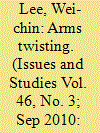

|
|
|
| 2 |
ID:
098102
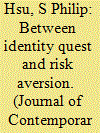

|
|
|
|
|
| Publication |
2010.
|
| Summary/Abstract |
This article argues that how President Chen Shui-bian's provocative initiatives have impacted cross-strait stability since 2003 generates crucial lessons, not available in the past, for understanding the propelling and constraining dynamics of a cross-strait military conflict in the long run. The lessons are grounded in three interrelated sets of interactive logic: between the Chen Administration and the Taiwan electorate; between Taiwan people's aspiration for an exclusive national identity and their risk-averse proclivity in the face of China's military threat; and between Washington's and Beijing's acts of signaling toward Taipei. Specifically, this article demonstrates that Taiwan's voters at first backed the Chen Administration's provocative initiatives in order to seek a national identity instead of de jure independence, and that such popular support receded dramatically once such initiatives came to be perceived, amidst domestic and international developments, by the voters as drifting away from the identity quest and toward evoking their choice between the status quo and independence. The risk-averse voters turned away from the altered character of the initiatives and thus restrained the reckless politicians, largely because of both Washington's signaling which highlighted the change and the ensuing risk of war, and Beijing's refraining from saber rattling toward Taiwan. The voters' decisions foiled the 2004 and 2008 referenda, and forestalled the DPP in 2004 from acquiring a parliamentary majority necessary for legislating its provocative initiatives such as renaming the country and creating a new constitution.
|
|
|
|
|
|
|
|
|
|
|
|
|
|
|
|
| 3 |
ID:
106245
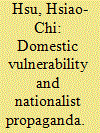

|
|
|
|
|
| Publication |
2011.
|
| Summary/Abstract |
In early 2006, President Chen Shui-bian of Taiwan surprised domestic and international audiences by announcing his intention to scrap the symbolically important National Unification Council (NUC) and the Guidelines for National Unification (GNU). This announcement not only invited strong criticism from Beijing, but also seriously strained U.S.-Taiwan relations, because it was a clear violation of Chen's 2000 inaugural pledge regarding cross-Strait policy. This policy proposal presented an important theoretical challenge to the broadly recognized election cycle model in Taiwan's mainland policymaking- unlike Chen's earlier nationalist propaganda, the NUC initiative came after instead of during a major election campaign. To address this anomaly, this paper argues that while domestic politics play a key role in Taiwan's mainland policymaking, gaining votes is not the state leader's only concern. A careful examination of the political context shows that Chen's NUC campaign was used to divert attention from his personal political crisis following on his loss of both control over policy and leadership over his party after the DPP's poor showing in the December 2005 elections for city mayors and county magistrates.
|
|
|
|
|
|
|
|
|
|
|
|
|
|
|
|
| 4 |
ID:
079135
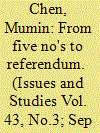

|
|
|
|
|
| Publication |
2007.
|
| Summary/Abstract |
This paper analyzes the development of Taiwan's security policy by exploring the decision-making of the Democratic Progressive Party (DPP) government under the leadership of President Chen Shui-bian from 2000 to 2004. The first part of the paper reviews the development of Taiwan-China relations and theoretical developments related to this subject, as well as the major theoretical approaches adopted by scholars and strategic analysts, to explain the influence of Taiwan-China relations on Taiwan's security. Next the paper attempts to define the structure and process of the security policymaking mechanism during Chen's government to identify the major "players" in the decision-making process and their roles. The last part of the paper examines the development of the referendum issue before the 2004 presidential election in order to show how President Chen's decision-making style affected the decision to hold the controversial referendum in March 2004, and how such a decision-making mechanism makes a foreign policy crisis inevitable. This paper finds that President Chen and his DPP government have a top-down decision-making style in which the president is supreme in deciding foreign policy objectives. Limited numbers of high-ranking officials are consulted or involved in the formulation of key policy objectives. This decision-making style often leads to poor communication between different decision-making levels and sometimes misunderstandings among government agencies.
|
|
|
|
|
|
|
|
|
|
|
|
|
|
|
|
| 5 |
ID:
107442
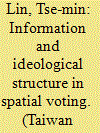

|
|
|
|
|
| Publication |
2011.
|
| Summary/Abstract |
This article aims at unifying the theory of spatial voting and the theory that is
variously called conceptualization, information, or sophistication. Following
Downs's early insights on uncertainty as well as recent developments in both
literatures, I argue that it is of critical importance that spatial voting models
explicitly incorporate information effects. For this purpose, I develop a
heteroskedastic probit model that allows for the specification of information
heterogeneity. This model is applied to the Taiwan Election and Democratization
Study's 2004 post-presidential election survey data. In 2004, Taiwan's political
landscape was dominantly defined by the Green vs. Blue ideological cleavage,
and the candidates were perceived as taking divergent positions. This article
investigates the effects of information and activism on the spatial structure and
their implications on candidates' strategies. My findings confirm the existence
of these effects on voter uncertainty in the framework of spatial analysis.
1
|
|
|
|
|
|
|
|
|
|
|
|
|
|
|
|
| 6 |
ID:
085884
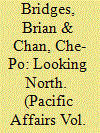

|
|
|
|
|
| Publication |
2009.
|
| Summary/Abstract |
On the 5th January 2007 the first high-express trains began to run between Taiwan's largest two cities, Taipei and Kaohsiung, Modelled on Japan's highly successful shinkansen (bullet trains), these trains were not just a significant export success for Japanese manufactures, but also symbolized th extent to which Taiwan's relationship wuth Japan has been quietly but steadily developing.
|
|
|
|
|
|
|
|
|
|
|
|
|
|
|
|
| 7 |
ID:
114784
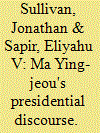

|
|
|
|
|
| Publication |
2012.
|
| Summary/Abstract |
This article focuses on the rhetoric of Taiwan's president Ma Ying-jeou on cross-Strait relations during his first term. The authors argue that his rhetoric varied considerably and put forward a framework for measuring, analyzing and explaining this variation. Analyzing speeches, addresses, etc., they provide empirical assessments of how the content of Ma's public pronouncements has developed over time, how his rhetoric varies according to the strategic context and timing of a speech, and how his discourse compares to that of his predecessor, Chen Shui-bian. In addressing these questions, the article contributes a quantitative perspective to existing work on political discourse in Taiwan.
|
|
|
|
|
|
|
|
|
|
|
|
|
|
|
|
| 8 |
ID:
077037
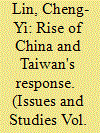

|
|
|
| 9 |
ID:
086682
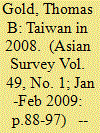

|
|
|
|
|
| Publication |
2009.
|
| Summary/Abstract |
The opposition Kuomintang (KMT) won overwhelming victories in the Legislative Yuan and presidential elections, leaving the Democratic Progressive Party (DPP) demoralized and in disarray. Former President Chen Shui-bian was indicted on corruption charges and jailed pending trial. New President Ma Yingjeou moved quickly to improve relations across the Taiwan Strait, and the long-delayed Three Links (direct air, shipping, and postal service) began in December. Taiwan's economy fared badly along with much of the rest of the world.
|
|
|
|
|
|
|
|
|
|
|
|
|
|
|
|
| 10 |
ID:
083256
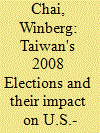

|
|
|
|
|
| Publication |
2008.
|
| Summary/Abstract |
Outgoing Taiwanese President Chen Shui-bian's Democratic Progressive Party (DPP) was defeated in the historic 2008 presidential and legislative elections, and voters returned the reins of government to the long-ruling Nationalist Party (KMT). The author analyzes the KMT's return to power after eight years of DPP rule, its significance, and its potential to create new stability in East Asia and better cooperation between the United States and Taiwan. The author also examines the reasons for the DPP's resounding defeat, including its traditional oppositional role in Taiwanese politics and its failure to deliver on its promises to reduce corruption and maintain economic well-being. The author further analyzes the DPP policies' disastrous impact on Taiwan's domestic scene and its regional alliances. The author concludes with a prediction of what the KMT's return will mean for U.S.-China-Taiwanese relations.
|
|
|
|
|
|
|
|
|
|
|
|
|
|
|
|